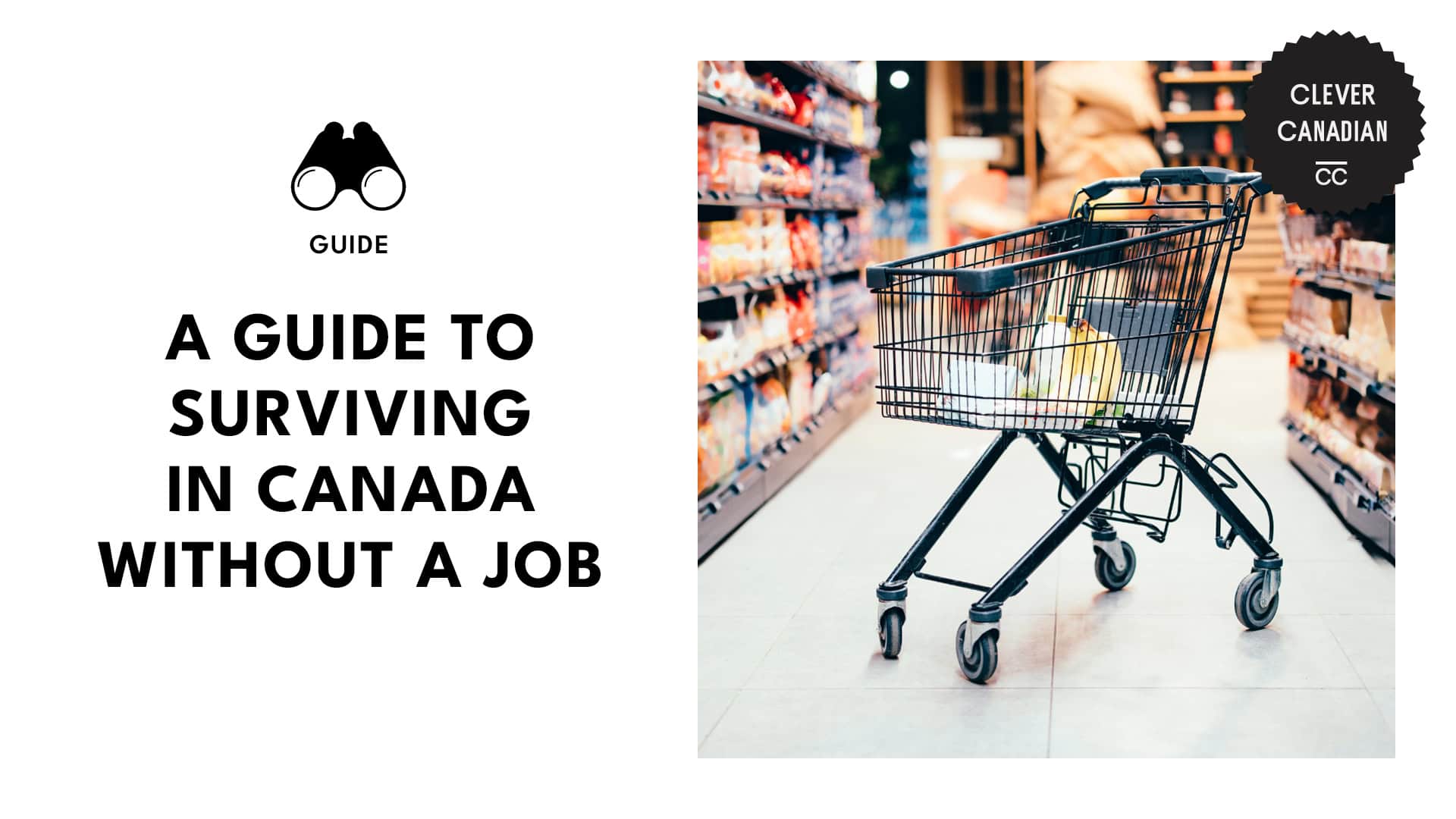Categories > Guides and Tips

A Guide to Surviving in Canada without a Job
Hey there, fellow Canuck! Feeling the pressure after losing your job? Don’t sweat it; we’ve got your back!
How can you survive in Canada without a job?
To survive in Canada even without a job, you must have smart financial management. You need to keep a strict budget, use free resources like libraries and recreational spaces, and tap into government benefits.
Also, it is important to know more information about the government aid that each province in Canada has to offer.
And hey, it’s just the tip of our iceberg. This handy guide will tell you more about how to survive in Canada without a job and keep that Canadian spirit shining bright. Read on!
Understand your rights and avail government support

Canada’s social support system is an extensive network of programs and services designed to help its citizens when they need financial assistance. These programs provide monetary aid, support for job seekers, and resources for vulnerable populations.
Major components are shown in our table below:
| Program | Description | Eligibility |
| Employment Insurance (EI) | Provides temporary income support for those who lost their job. | Must have worked a certain number of insurable hours and are actively looking for work. |
| Canada Pension Plan (CPP) | A monthly pension payment for retired Canadians. | Aged 60 or older; contributed to the CPP. |
| Old Age Security (OAS) | Pays a monthly income to eligible seniors. | Aged 65 or older; lived in Canada for 10+ years. |
| Guaranteed Income Supplement (GIS) | Supplements the OAS pension for low-income seniors. | Receiving OAS; meet income requirements. |
| Social Assistance (Welfare) | Income support for those in financial need. | Financially eligible; meet program rules and requirements. |
| Local Tip: Connecting with local organisations in your area, like food banks and community resource centres, can also provide support and additional resources. |
Apply for unemployment insurance

Applying for unemployment insurance, or employment insurance (EI), can help bridge the gap between jobs by providing you with temporary financial support. Here’s how to apply:
- Determine if you’re eligible: To qualify for EI, you must have lost your job through no fault of your own, be actively looking for work, and have worked the required number of insurable hours.
- Gather required documents: Prepare information on your past employment, including employment dates, earnings, reason for separation, and a Record of Employment (ROE).
- Apply online: Visit the Government of Canada’s Employment Insurance website and follow the instructions to apply.
- Await your EI decision: Processing times may vary, so it’s essential to monitor your account for updates.
- Report your job search activities: To maintain your eligibility, you must regularly update your job search progress using the bi-weekly EI reports.
| Local Tip: Don’t hesitate to get help from the staff at your local Service Canada Center if you have any questions about the application process. |
Be informed about welfare state programs

Welfare or social assistance programs in Canada vary by province and territory but generally aim to support those who are unable to work or have minimal income. These programs include:
- Income assistance: Provides financial help for basic needs like food, clothing, and shelter.
- Disability assistance: This supports people with disabilities who may need additional financial aid or help with job security.
- Child and family benefits: Offers financial support for families and single parents with children.
To qualify, you must meet the eligibility criteria based on your province or territory’s rules and requirements. This often includes:
- Residency: You must be a resident of the province or territory where you apply.
- Financial need: You must demonstrate financial need based on certain income and asset limitations.
- Work status: Depending on the program, you may need to show that you’re actively seeking employment or have a medical reason preventing you from working.
| Local Tip: Check your specific provinces or territory’s social assistance website to learn more about eligibility and application procedures. |
Know how to handle financial turbulence

If you’ve lost your job and are waiting for government support to kick in or need additional aid, consider these tips to stay afloat financially:
- Create a budget and prioritise spending on essentials like rent, utilities, and groceries.
- Reduce or eliminate non-essential expenses, such as dining out, entertainment, and subscriptions.
- Seek part-time or temporary employment to supplement your income.
- Reach out to friends, family, or community support networks for help.
- Explore additional provincial or federal benefits and programs, such as childcare subsidies or tax credits.
- Consult with a non-profit credit counsellor to help you create a budget and manage your debt.
Manage your living expenses well

The cost of living varies greatly across our diverse and vast country. Generally, bigger cities like Toronto and Vancouver tend to be on the pricier side, while smaller towns and rural areas tend to be more affordable.
Here’s a snapshot of average monthly costs for a single person in a few Canadian locales by LivingCost.org:
| City | Food | Rent (1 bedroom apt.) | Utilities | Public Transit |
| Toronto | $581 | $1563 | $1500 | $250 |
| Vancouver | $578 | $1677 | $1583 | $159 |
| Calgary | $561 | $1061 | $1126 | $180 |
| Ottawa | $526 | $1208 | $1172 | $183 |
| Halifax | $594 | $1197 | $1223 | $97.2 |
| Local Tip: Some cities have a lower cost of living but higher transportation costs, and vice versa. It pays to consider all factors when evaluating the real cost of living in a place. |
Learn how to do proper budgeting

Budgeting is your financial Swiss army knife in the battle against unnecessary expenses. By knowing exactly where your money is coming and going, you can allocate your funds more wisely and cut costs efficiently.
But how do you budget? Simply track your daily income and expenses; recognize your ‘needs’ and ‘wants’; plan your spending; and most importantly, stick to your spending limits.
Free online budgeting tools like Mint and You Need a Budget can make this process simpler.
| Local Tip: Local community centres often offer free budgeting workshops, so take advantage of these priceless resources! |
Reduce unnecessary expenditures
With a firm budget now guiding your finances, the next big step is reducing unnecessary expenditures. This may look different for everyone depending on individual lifestyles, but here are some general tips to consider:
- Consolidate and eliminate debt: High-interest debts like credit cards can drastically increase your expenditures. Consider various consolidation options to reduce interest rates and eliminate debt wherever possible.
- Cut the cord: Cancel expensive cable packages and switch to more affordable streaming services.
- Shop smart: Use coupons, take advantage of sales, and buy in bulk for non-perishable goods.
- Meal prep at home: Eating out frequently can take a hefty toll on your wallet. Consider meal planning and preparing food at home to save more.
- Use public transport or carpool: With gasoline prices and insurance costs, maintaining a car can be a significant drain on your budget. Look at alternatives like public transportation or carpooling.
- Explore thrift options: Your local thrift shop is a treasure trove for affordable clothing, furniture, and other items, saving your hard-earned loonies!
Avail free and low-cost resources
Take advantage of free recreational resources

Grab your toques because Canada is genuinely a haven for cost-effective fun! From majestic mountains to craft festivals, we have countless recreational resources that are free or cost very little.
Firstly, take advantage of municipal parks and local trails for a refreshing hike or a leisurely bike ride.
The Great Trail, the world’s longest network of recreational trails, is completely free and traverses urban, rural, and wilderness landscapes in every province.
Then, utilise your local library, because beyond books, they typically offer free access to the internet, movie rentals, and various classes or events. Plus, they’re a great place to warm up during our chilly winters, eh?
| Local Tip: Check out free or donation-based community events, workshops, and fitness classes. Local event sites and community bulletin boards often list these gems. Remember to also explore national parks on free entry days. |
Embrace the wealth of affordable health resources

Take a moment, and let’s think about staying healthy. The healthcare system in Canada includes several free or affordable resources designed to keep you healthy and hearty. For instance, healthcare consultations and treatments are free for Canadian residents.
Provinces also offer extra support. In Ontario, programs like the Trillium Drug Program aid those with high medication costs. Quebec’s public health insurance offers a range of services.
Free dental clinics and mobile health vans often operate in metropolitan cities. Keep an eye on local listings for these services.
It’s also important to invest time in mental health. Counselling support is provided through provincial health lines like the Ontario Mental Health Helpline or local mental health centres.
| Local Tip: For health emergencies or urgent care needs, seek care at the numerous “walk-in” clinics readily available in most cities. |
Seize opportunities from community services

Another fantastic part of living in Canada is the vast range of community services and organisations at your disposal. They offer job search resources, legal advice, housing assistance, and more.
Most municipalities have local employment centres offering resources like job boards, workshops, resume support, and career counselling. Universities and colleges often have similar services for students and alumni.
Local legal aid offices can provide free or inexpensive legal advice and representation in matters like housing or employment disputes.
Community organisations often offer resources tailored to specific demographics, like single parents, immigrants, or seniors.
| Local Tip: Your local community centre is a one-stop shop for numerous resources and services. Stop by and see what’s available! |
Utilise food banks and local charities

When times are tough, food banks and local charities are there to offer support.
Food banks provide temporary relief to individuals and families in need of food assistance. Check out Food Banks Canada to find a food bank near you.
Also, many communities have soup kitchens that provide nutritious meals, like Toronto’s Daily Bread Food Bank or Ottawa’s Shepherds of Good Hope.
Local charities provide varying services, from clothing to school supplies. Resources like the 211 directory can help you explore these.
| Local Tip: Remember, these resources are here for times of need. Do not hesitate to use them when you need them. |






